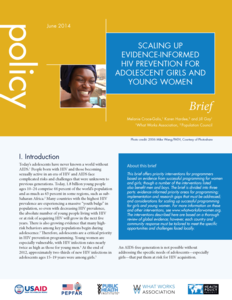The Health Policy Project ended in 2016. Work continued under Health Policy Plus (HP+) until 2022.
PUBLICATION
Author(s): Melanie Croce-Galis, Karen Hardee, Jill Gay
Primary Language: English
Date: 6/25/2014
Abstract:
Adolescent girls and young women are a critical priority in HIV prevention programming. People born with HIV and those becoming sexually active in an era of HIV and AIDS face complicated risks and challenges that were unknown to previous generations. Today, 1.8 billion young people ages 10–24 comprise 26 percent of the world’s population and as much as 32 percent in some regions, such as sub-Saharan Africa. Many of the countries with the highest HIV prevalence are experiencing a massive "youth bulge" in population, so even with decreasing HIV prevalence, the absolute number of young people living with HIV or at risk of acquiring HIV will grow in the next five years. Young women are especially vulnerable, with HIV infection rates nearly twice as high as those for young men. At the end of 2012, approximately two-thirds of new HIV infections in adolescents ages 15–19 were among girls. Scaling up evidence-informed interventions for adolescents is essential. This brief offers priority interventions for programmers based on evidence from successful programming for women and girls; though a number of the interventions listed also benefit men and boys. The brief is divided into three parts: evidence-informed priority areas for programming; implementation and research gaps that must be addressed; and considerations for scaling up successful programming for girls and young women. For more information on these and other interventions see www.whatworksforwomen.org.
What Works for Women & Girls is supported by the U.S. President's Emergency Plan for AIDS Relief (PEPFAR) and Open Society Foundations and is being carried out under the auspices of the USAID-supported Health Policy Project, the Public Health Institute, and What Works Association, Inc. For more information, please visit www.whatworksforwomen.org or email mcrocegalis@gmail.com.


